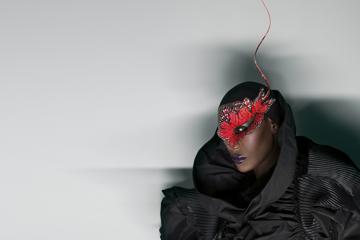Is 'Revival' Eminem's Best Work Yet?
Mathers – the top-selling rapper ever – betrays a new self-consciousness about his music. Rather than buckle to complacency, Mathers has had a crisis of confidence.

Since 2009, Detroit hip hop phenom Eminem (aka Marshall Mathers) has been all about the three 'Rs' – releasing albums with the titles Relapse, Recoveryand now Revival. In fact, he is allegorising his old dependency on prescription drugs to chronicle his career – and relationship – struggles. 'Revival' is another word for 'comeback' and this follow-up to 2013's The Marshall Mathers LP 2 finds the Rap God repositioning himself in a hip hop scene today populated by mumble rappers. However, Mathers likewise re-evaluates his life as Jay Z did on 4:44.
The quasi-emo Mathers has long expressed a degree of personal vulnerability in a genre equated with hyper-masculinity. Indeed, he paved the way for Kanye West, Drake and the late Lil Peep (surely more like a baby Em than the "rap Kurt Cobain") to explore themes of anxiety, depression and neurosis. But, on Revival, Mathers – the top-selling rapper ever – betrays a new self-consciousness about his music. Rather than buckle to complacency, Mathers has had a crisis of confidence. He is afraid.
Opening Revival is the lead single Walk On Water – a stately piano ballad with Beyonce providing a gospel hook (Rick Rubin, in Adele-format, co-produces alongside Skylar Grey). Mathers douses fans' expectations about his genius, before rallying with his usual defiance.
Mathers grew up working-class in black Detroit (as depicted in his biopic 8 Mile). Mentored by Dr Dre, his status as a white MC initially caused significant disquiet. Mathers acknowledged his white privilege in 2002's White America. He pre-empted the generally-tolerated Macklemore, Mac Miller and G-Eazy. But, post-Eminem, some white rappers – cue: the Aussie Iggy Azalea and Post Malone – have failed to negotiate American race relations.
Don't miss a beat with our FREE daily newsletter
Meanwhile, Mathers has cut other political records. He vehemently protested George W Bush (and the Iraq War) in Mosh. Still, he's primarily known for being politically-incorrect – introducing that comic horrorcore alter-ego, Slim Shady. Yet Revival, which has the US flag on its cover, is Mathers' most politically-charged work. In Untouchable – a six-minute saga split by way of the on-trend beat switch – he tackles America's systemic racism from the perspectives of a racist white cop, a black man, and himself as a #BlackLivesMatter ally.
As astonishing, Mathers is broaching something like… fEMinism. The number of female vocalists on Revival is high – the most buzz, Kehlani bringing her SweetSexySavage vibe to Nowhere Fast. P!nk dominates the stadium song Needed Me – Mathers harmonising with her. The rapper even prominently samples iconic femme rockers, with Remind Me flipping Joan Jett & The Blackhearts' I Love Rock 'N Roll, and In Your Head The Cranberries' Zombie – Dolores O'Riordan's '90s protest of Ireland's sectarianism. Grey – who co-penned Mathers's anti-romance duet with Rihanna, Love The Way You Lie – has production credits. Crucially, Mathers tackles his past misogyny. In Recovery's emotional Headlights, he apologised to his mom, Deborah Nelson, for airing grievances in songs. Here, in the impassioned, candid and redemptive Bad Husband, Mathers analyses his troubled union with Kimberly "Kim" Scott: "You hit me once, and that I would use/To continue the pattern of abuse/Why did I punch back?" Scott was Mathers' childhood sweetheart – and they welcomed a beloved daughter, Hailie, prior to the rapper's ignominious debut Infinite of 1996. But, in marrying and divorcing each other twice, the couple became the Heathcliff and Cathy of hip hop. Infamously, in '97 Bonnie And Clyde, from Mathers' break-out The Slim Shady LP, he rapped about murdering Scott and dumping her body – with Hailie, his 'Bonnie', along for the ride.
Mathers remains contradictory. Framed is a Shady throwback – a meta-murder tale the likes of which even Tyler, The Creator has shed. Just as dodgy is the Beastie Boys-referencing Heat with Mathers' creepy joke about pussy-grabbing: "Grab you by the (meow!), hope it's not a problem, in fact/about the only thing I agree on with Donald is that." Offended is a de facto IDGAF D12 cartoon anthem – Mathers reverting to enfant terrible (and demonstrating his prowess as a speed rapper).
Revival's profoundest moments happen when Mathers ruminates on his mortality – the star nearly overdosing on methadone in 2007. The final two songs interconnect in a way Kendrick Lamar will appreciate. In Castle, Mathers addresses Hailie in a series of fictional letters. In Arose, for which Rubin kitschily repurposes country sweetheart LeAnn Rimes' cover of Bette Midler's The Rose, he re-enacts that near-death experience. The track then rewinds to Castle. Mathers symbolically flushes the drugs down the loo.
Mathers has never rapped with greater skill or compulsion – his intricate, literary lyrics seemingly written for Genius annotations. But, while executive produced by Dre and Rubin, Revival is conservative musically. Mathers was never a sonic innovator – clinging to his blue-collar mode of hip hop with strident rock influence. And, mega-loyal, he continues to collab with producers like the gritty, but predictable, Porter and Alex da Kid, a Brit into his polished crossover bangers. At a time when hip hop is super-avant, and electronic, rap-rock is passé. Mind, in 2017, a trap Eminem would be fake. Dude is literally trapped. And Mathers' curation, too, is hit-and-miss. The outrage surrounding Ed Sheeran's appearance on the biblical River – Emile Haynie-stamped folk rock – is ridic. Regardless, with his bluesy howl, Future Islands' Samuel T Herring would have been so much more unique.
Ultimately, the seasoned Jay-Z and Nas have stayed relevant by developing captivating narratives and original concepts, respectively – prompting endless thinkpieces. Dudes better make space for Em.







